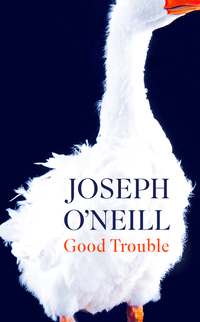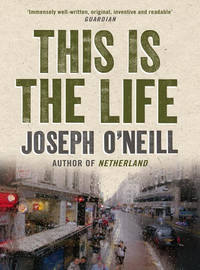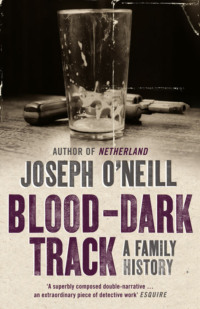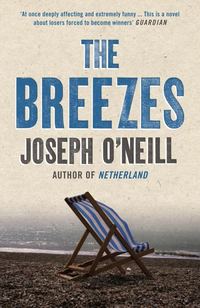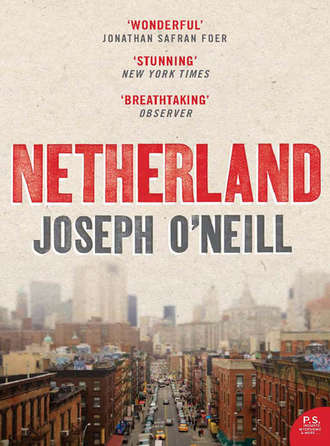
Полная версия
Netherland
‘What about that market on Flatbush and Church?’ Chuck said. ‘You find it there.’
‘Well, maybe,’ Roy conceded. ‘But if you can’t get the real thing, you make it with spinach. You put in coconut milk: you grate the flesh of the coconut fine and you squeeze it and the moisture come out. You also put in a whole green pepper – it don’t be hot unless you burst it – thyme, chive, garlic, onion. Normally you put in blue crab; others put in pickled pigtails. You cook it and you bring out a swizzle stick and you swizzle it until the bush melt down into a thick sauce like a tomato sauce. That’s the old-time way; now we put it in a blender. Pour it on stewfish – kingfish, carite fish: mmm-hmm. You also eat it with yam, sweet potato. Dumpling.’
Chuck said to Vinay, ‘He’s not talking about Chinese dumplings.’
‘Our dumpling different,’ Roy said. ‘Chinese dumpling soft. We make our dumpling stiff.’
‘Callaloo,’ Chuck said wistfully.
‘We used to eat it at Maracas Bay,’ Roy said. ‘Or Las Cuevas. Maracas, the water more rough but the beach more popular. In Las Cuevas, the water calm. Easter time? Oh my Lord, it full. Sometime people walk for miles through the mountains to go there. You spend Easter Sunday and Easter Monday on the beach. You pack your bag with ingredients separate. You have your sweet drink – we call sodas sweet drink – and you pack your car and everybody take a bathing suit, and you go to the beach and spend the whole day eating, bathing. Oh my.’ He shuddered with pleasure.
‘I nearly drowned in Maracas once,’ Chuck said.
‘Them riptide there dangerous, boy,’ Roy said.
Chuck handed a card to Vinay. ‘Maybe you could come by my restaurant sometime.’
Vinay examined the card. ‘Kosher sushi?’
‘That’s what we do,’ Chuck said proudly. He leaned over to point at the card. ‘That’s where we are – Avenue Q and Coney Island.’
‘Business good?’ I asked.
‘Very good,’ he said. ‘We cater to the Jews in my neighbourhood. There are thousands and thousands of them, all observant.’ Chuck handed me a card, too. ‘I have a Jewish partner who has the confidence of the rabbi. Makes things a lot easier. But I tell you, getting kosher certification is a tough business. Tougher than the pharmaceuticals business, I like to say. You wouldn’t believe the problems that come up. Earlier this year we had some trouble with seahorses.’
‘Seahorses?’ I said.
Chuck said, ‘You know how you check nori, the seaweed you wrap the sushi in? You examine it over a light box, like an X-ray. And they found seahorse infestation in our supplier’s seaweed. And seahorses are not kosher. Neither are shrimps and eels and octopus and squid. Only fish with scales and fins are kosher. But not all fish with fins have scales,’ Chuck added. ‘And sometimes what you think are scales are in fact bony protrusions. Bony protrusions do not qualify as scales. No, sir.’ Roy and he laughed loudly at this. ‘What are we left with? Halibut, salmon, red snapper, mackerel, mahi-mahi, tuna – but only certain kinds of tuna. Which ones? Albacore, skipjack, yellowfin.’
Chuck wasn’t going to stop there. He believed in facts, in their momentousness and charm. He had no option, of course: who was going to listen to mere opinion coming from him?
‘What about fish eggs, roe?’ he said, showing off. ‘The eggs of kosher fish are generally shaped differently from non-kosher fish. Also, they tend to be red, whereas non-kosher are black. Then there are issues with rice, issues with vinegar. Sushi vinegar will often have non-kosher ingredients, or will be made using a non-kosher process. There are issues with worms in the flesh of the fish, with utensils, with storage, with filleting, with freezing, with sauces, with the broths and oils you pack the fish in. Every aspect of the process is difficult. It’s a painstaking business, I’m telling you. But that’s my opportunity, you see. I don’t mind complication. For me, complication represents an opportunity. The more something is complicated, the more potential competitors will be deterred.’
‘So you’re a restaurateur,’ I said, moving my chair to let pass two dramatically bearded and turbaned men who had risen to their feet to face up to whatever night toil awaited them.
‘I’m a businessman,’ Chuck quibbled agreeably. ‘I have several businesses. And what do you do?’
‘I work at a bank. As an equities analyst.’
‘Which bank?’ Chuck asked, filling his mouth with Vinay’s chicken. When I told him, he improbably declared, ‘I have had dealings with M——. What stocks do you analyse?’
I told him, eyeing the television: Fleming had just punched Akhtar through the covers for four runs, and a groan of disgust mixed with appreciation sounded in the restaurant.
‘Do you think there’s much left in the consolidation trend?’
I turned to give him my attention. In recent years, my sector had seen a rush of mergers and acquisitions. It was a well-known phenomenon; nevertheless, the slant of Chuck’s enquiry was exactly that of the fund managers who questioned me. ‘I think the trend is in place,’ I said, rewarding him with a term of professional wiliness.
‘And before M——you worked where?’ Chuck said. He was blithely curious.
I found myself telling him about my years in The Hague and London.
‘Give me your e-mail address,’ Chuck Ramkissoon said. ‘I have a business opportunity that might interest you.’
He handed me a second card. This read,
CHUCK CRICKET, INC.
Chuck Ramkissoon, President
He said, as I wrote down my own details, ‘I’ve started up a cricket business. Right here in the city.’
Evidently something showed in my expression, because Chuck said good-naturedly, ‘You see? You don’t believe me. You don’t think it’s possible.’
‘What kind of business?’
‘I can’t say any more.’ He was eyeing the people around us. ‘We’re at a very delicate stage. My investors wouldn’t like it. But if you’re interested, maybe I could use your expertise. We need to raise quite a lot of money. Mezzanine finance? Do you know about mezzanine finance?’ He lingered on the exotic phrase.
Vinay had stood up to leave, and I also got up.
‘So long,’ I said, mirroring Roy’s raised hand.
‘I’ll be in touch,’ Chuck said.
We stepped into the night. ‘What a crazy son of a bitch,’ Vinay said.
After the passage of a week or so, I received a padded envelope at my office. When I opened the envelope, a postcard fell out.
Dear Hans,
You know that you are a member of the first tribe of New York, excepting of course the Red Indians. Here is something you might like.
Best wishes,
Chuck Ramkissoon
Smothered by the attentiveness, I put the envelope back in my briefcase without further examining it.
A few days later, I caught the Maple Leaf Express, bound for Toronto, to Albany, where a group of investors awaited. It was a brown November morning. Rain spotted my window as we pulled away into the tunnels and gorges through which the Penn Station trains secretively dribble up the West Side. At Harlem, the Hudson, flowing parallel to the track, came into view. I had taken this journey before, yet I was startled afresh by the existence of this waterside vista, which on a blurred morning such as this had the effect, once we passed under the George Washington Bridge, of cancelling out centuries. The far side of the river was a wild bank of forest. Clouds steaming on the clifftops foxed all sense of perspective, so that it seemed to me that I saw distant and fabulously high mountains. I fell asleep. When I awoke, the river had turned into an indeterminate grey lake. Three swans on the water were the white of phosphor. Then the Tappan Zee Bridge came clumsily out of the mist, and soon afterwards the far bank reappeared and the Hudson again was itself. Tarrytown, a whoosh of parking lots and ballfields, came and went. The valley slipped back into timelessness. As the morning lightened, the shadows of the purple and bronze trees became more distinct on the water. The brown river, now very still, was glossed in places, as if immense silver tyres had skidded there. Soon we were inland, amid trees. I stared queasily into their depths. Perhaps because I grew up in the Low Countries, where trees grow either out of sidewalks or in tame copses, I only have to look at New York forests to begin to feel lost in them. I drove upstate numerous times with Rachel, and I strongly associate those trips with the fauna whose corpses lay around the road in great numbers: skunks, deer and enormous indecipherable rodents that one never found in Europe. (And at night, when we sat on a porch, gigantic moths and other repulsive night-flyers would thickly congregate on the screen, and my English wife and I would shrink into the house in amazement and fear…) My thoughts went back to a train journey I’d often made, in my student days, between Leiden and The Hague. The yellow commuter train ran through canal-crossed fields as dull as graph paper. Always one saw evidence of the tiny brick houses that the incontinent local municipalities, Voorschoten and Leidschendam and Rijswijk and Zoetermeer, pooped over the rural spaces surrounding The Hague. Here, in the first American valley, was the contrary phenomenon: you went for miles without seeing a house. The forest, filled with slender and thick trunks fighting silently for light and land, went emptily on and on. Then, gazing out of the window, my eye snagged on something pink. I sat up and stared.
I’d caught sight of a near-naked white man. He was on his own. He was walking through the trees wearing only underpants. But why? What was he doing? Why was he not wearing clothes? A horror took hold of me, and for a moment I feared I’d hallucinated, and I turned to my fellow passengers for some indication that might confirm what I’d seen. I saw no such indication.
I was relieved, then, at the appearance shortly afterwards of Poughkeepsie. I’d visited the town, with its merry name that sounds like a cry in a children’s game – Poughkeepsie! – for the first time that summer. In its bucolic outskirts a colony of Jamaicans maintained a cricket field on a lush hillside. It was the only privately owned ground we played on, and the farthest north we travelled. The trip was worth it. There was a bouncy but true batting track made of cement; rickety four-deep bleachers filled with shouting spectators; and the simplest wooden shack for a locker room. If you smashed the ball down the hill it landed among cows, goats, horses, chickens. After the match – marked by an umpiring crisis, inevitably – every player went to the clubhouse in downtown Poughkeepsie. The clubhouse was a cabin with a small bar. Prominent signs warned against the use of marijuana. Presently women appeared with platters of chicken and rice. We ate and drank quietly, half following a dominoes game being played with the solemnity that often marked the social dealings of West Indian cricket teams in our league. Our hosts were proud to take care of us, to offer us a territory of their own in this remote place, and we were grateful. The tilted pretty cricket ground, the shipshape clubhouse – such pioneering effort had gone into them!
Somewhere beyond Poughkeepsie I opened my briefcase to glance at work documents. Protruding from a pocket was Chuck’s gift. I opened the envelope and withdrew a booklet. Titled Dutch Nursery Rhymes in Colonial Times, the booklet was a reprint, made by the Holland Society of New York, of the 1889 original edited by a Mrs E. P. Ferris. I turned the pages with some curiosity, because I knew next to nothing about the ancient Dutch presence in America. There was a song in Dutch about Molly Grietje, Santa Claus’s wife, who made New Year koekjes, and a song about Fort Orange, as Albany was first known. There was a poem (in English) titled ‘The Christmas Race, A True Incident of Rensselaerwyck’. Rensselaerwyck was, I surmised, precisely the district through which my train was now travelling. Stimulated by the coincidence, I gave the poem my closer attention. It commemorated a horse race under ‘the Christmas moon’ at Wolvenhoeck, the corner of the wolves. The owners of the horses were a certain Phil Schuyler and a gentleman referred to only as Mijnheer: ‘Down to the riverbank, Mijnheer, his guests, and all the slaves / went trooping, while a war whoop came from all the Indian braves … / The slaves with their whale lanterns were passing to and fro, / Casting fantastic shadows on hills of ice and snow.’ In addition to this poem there were hymns, spinning songs, cradle songs, churning songs and trotting songs – songs you sang while trotting your child on your knee – apparently in use all over New Netherland, from Albany to Long Island to the Delaware River. One such song caught my attention:
Trip a trop a troontjes
De varkens in de boontjes,
De koetjes in de claver,
De paarden in de haver,
De eendjes in de water-plas,
De kalf in de lange gras;
So groot mijn kleine——was!
You sang your child’s name where the blank was. Adapting the melody of the St Nicholas song that every Dutch child hungrily learns (Sinterklaas kapoentje / Gooi wat in mijn schoentje …), I hummed this nonsense about pigs and beans and cows and clover to my faraway son, tapping my knee against the underside of the lowered tray as I imagined his delighted weight on my thigh.
The week before, Jake and I had played in his grandparents’ garden. I raked leaves into piles and he helped me bag the leaves. The leaves were dry and marvellously light. I added armloads to the red and brown and gold crushed in the plastic sack; Jake picked up a single leaf and made a cautious, thrilled deposit. At one point he put on his superhero frown and charged a hillock of leaves. Wading into its harmless fire, he courageously sprawled. ‘’Ook, ’ook!’ he screamed as he rolled in the leaves. I looked, and looked, and looked. Fronds of his yellow hair curled out from the hood’s fringe onto his cheeks. He wore his purple quilted jacket, and his thermal khakis with an inch of tartan turn-up, and his blue ankle boots with the zip, and the blue sweater with the white boat, and – I knew this because I had dressed him – his train-infested underpants, and the red T-shirt he liked to imagine was a Spiderman shirt, and Old Navy green socks with rubbery lettering on the soles. We gardened together. I demonstrated how to use a shovel. When I dug up the topsoil, I was taken aback: countless squirming creatures ate and moved and multiplied underfoot. The very ground we stood on was revealed as a kind of ocean, crowded and immeasurable and without light.
Blocks of colour stormed my window for a full minute. By the time the freight train had passed, the sky over the Hudson Valley had brightened still further and the formerly brown and silver Hudson was a bluish white.
Unseen on this earth, I alighted at Albany – Rensselaer with tears in my eyes and went to my meeting.
Chapter 7
Sometimes to walk in shaded parts of Manhattan is to be inserted into a Magritte: the street is night while the sky is day. It was into one such dreamlike, double-dealing evening in January 2003, at Herald Square, that I stumbled out of the building occupied by New York’s Department of Motor Vehicles. After years of driving rental cars with a disintegrating and legally dubious international licence issued in the United Kingdom, I had finally decided to buy and insure a car of my own – which required me to get an American driver’s licence. But I couldn’t trade my British licence (itself derived from a Dutch one) for an American one: such an exchange was for some unexplainable reason only feasible during the first thirty days of an alien’s permanent residence in the United States. I would have to get a learner permit and submit to a driving test all over again: which entailed, as a first step, a written examination on the rules of the road of the Empire State.
At the time, I didn’t question this odd ambition or my doggedness in relation to it. I can say quite ingenuously that I was attempting to counter the great subtractions that had lessened my life and that the prospect of an addendum, even one as slight as a new licence and a new car, seemed important at the time; and no doubt I was drawn to a false syllogism involving the nothingness of my life and the somethingness of doing. All that said, I didn’t let Rachel know what I was up to. She would have taken my actions as a statement of intent, and maybe she wouldn’t have been entirely wrong. It would not have helped much to point out that, if I was indeed embracing an American lot, then I was doing so unprogrammatically, even unknowingly. Perhaps the relevant truth – and it’s one whose existence was apparent to my wife, and I’m sure to much of the world, long before it became apparent to me – is that we all find ourselves in temporal currents and that unless you’re paying attention you’ll discover, often too late, that an undertow of weeks or of years has pulled you deep into trouble.
Carried along, then, by the dark flow of those times, I approached the Department of Motor Vehicles. The DMV was in a building coated in black glass and chiefly identifiable by a large sign for Daffy’s, an entity I took to be somehow connected to Daffy Duck but which turned out to be a department store. I avoided Daffy’s – and Modell’s Sporting Goods, and Mrs Fields Cookies, and Hat & Cap, and Payless ShoeSource, other occupants of the eerily unfrequented mall known as the Herald Centre – by taking the express elevator to the eighth floor. A bell for the benefit of the blind burped at intervals as I rose. Then the elevator door halved and slid away and I stood before the DMV premises. There was a static turnstile like a monster’s unearthed skeleton, and there was a set of glass doors in constant use. Approaching these, I was barged into by a middle-aged woman making her exit.
Конец ознакомительного фрагмента.
Текст предоставлен ООО «ЛитРес».
Прочитайте эту книгу целиком, купив полную легальную версию на ЛитРес.
Безопасно оплатить книгу можно банковской картой Visa, MasterCard, Maestro, со счета мобильного телефона, с платежного терминала, в салоне МТС или Связной, через PayPal, WebMoney, Яндекс.Деньги, QIWI Кошелек, бонусными картами или другим удобным Вам способом.



